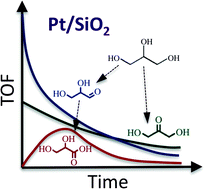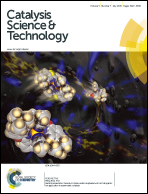Factors affecting activity and selectivity in the oxidation of glycerol promoted by platinum catalysts
Abstract
The kinetics of the catalytic oxidation of glycerol in water solutions by O2 gas, promoted by silica-supported platinum catalysts, was characterized. The reaction was optimized as a function of temperature, glycerol concentration, and oxygen flow rates. Critically, it was observed that, at least in batch reactors, both activity and primary selectivity (between the terminal and central alcohol groups, to yield glyceraldehyde and dihydroxyacetone, respectively) depend strongly on the extent of conversion of the reaction, a result that may call into question some of the conclusions reached for this system in previous studies. It was determined that the observed changes are mainly due to a reversible poisoning of the catalyst by dihydroxyacetone (and possibly other primary products), not to a secondary effect from subsequent conversion of glyceraldehyde to glyceric acid or other products. In addition, it was found that the conversion of a fresh reaction mixture with a recycled catalyst after mild reconditioning, or even after no treatment at all, displays almost the same activity and selectivity as in the initial catalytic run. Multiple use of the catalyst does lead to slow deactivation, presumably because of a buildup of carbonaceous deposits on the surface, and more stringent pretreatments cause irreversible Pt nanoparticle sintering.


 Please wait while we load your content...
Please wait while we load your content...